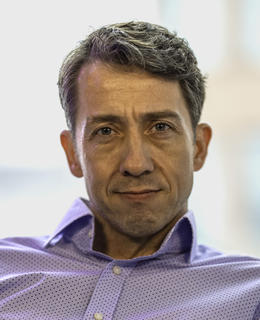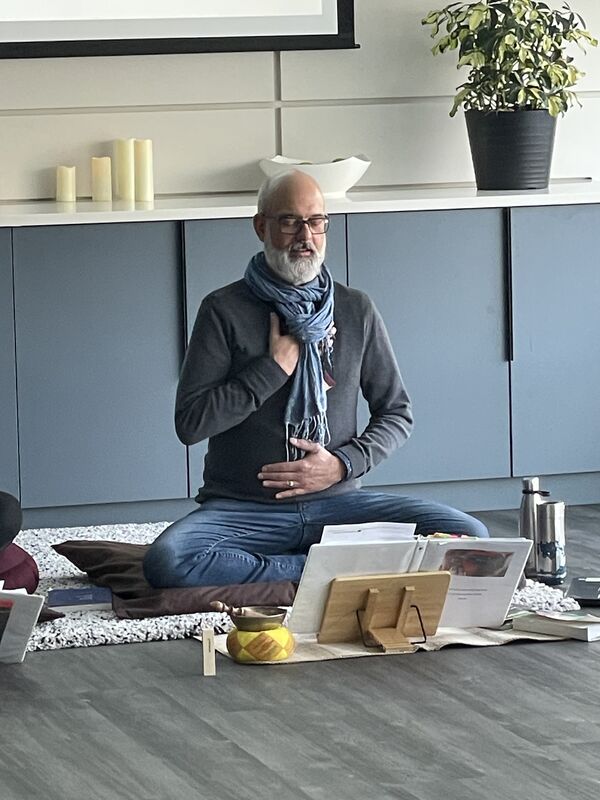When the Catholic Health Corporation of Manitoba was rebranded Réseau Compassion Network (RCN) in 2020, there was much thought and discussion around the essence of the work done within our organizations. How to best represent the spirit, the values and the faith that guides our work, in a contemporary setting?
Compassion. The word is in our title and imprinted on all that we do. It is more than vocabulary; it’s a way of being. It’s also a proven way to improve care and improve outcomes in our communities.

Dr. Shane Sinclair is the founder and director of the Compassion Research Lab, based in Calgary. The organization specializes in understanding, researching and promoting compassion in health care. “Compassion matters in these environments, most of all because it matters deeply to patients and families,” he explains. “From our work, we know that it is woven through every experience and is important in every interaction. It impacts patient outcomes, their satisfaction and their experience. Compassion is the glue of health care.”
At RCN, where one of our main goals is to ensure the spirit of care, love and community instilled into organizations by women religious continues to live on, we are dedicated to creating the conditions for compassion to thrive. Andrew Terhoch, a Spiritual Health Practitioner with St.Amant and RCN, is partially responsible to helping to support leaders and staff as they lean into compassion as a way of being at work.
“Compassion is a medical term for love, really,” he reflects. “It means I see you, it means I feel with you. It creates the condition for love to arise and for us to find our way to being with suffering. We’re not trying to fix it or to make it go away, because suffering is part of being human, and sometimes part of being ill, but this is how RCN is responding: with compassion.”
Terhoch offers contemplative practices for staff and volunteers from across RCN. Currently, there are two 5-day retreats offered to leaders each year, mini-retreats offered monthly, as well as a short weekly meditation circle held over Zoom.
“We believe that those who are leading have to be given the space and support so that they have the ability to cultivate presence in themselves,” Terhoch continues. “With retreats, we’re not teaching anything. We’re creating the space for people to care for each part of themselves, unconditionally. We’re giving them the gift of time and space to love themselves. It’s beautiful to see that happen, to see these busy people slow down and reconnect with their calling.”
Dr. Sinclair acknowledges that while the main reason for compassion is to create safe and healing spaces for patients and families, there is an important secondary effect: it impacts healthcare providers positively, as well. In a time of over-burdened health and social service systems, and increasing demands on a thinly stretched organizations, compassion has a protective quality. “The data is clear,” continues Dr. Sinclair. “There’s a host of ways that compassion impacts staff: workplace wellness, employment satisfaction, mitigating against burnout, retention of employees… compassion is a very big ingredient in all of those measurable factors.”

With RCN actively finding ways to help leaders cultivate compassion, the next step becomes spreading the value and the practices of compassion throughout the entire network. “How do we operationalize compassion?” Terhoch wonders. “I know how that sounds, it sounds devoid of spiritual connection. But I also know that people come into our network organizations and tell us that something feels different. We have to protect that. We have to know the source of what makes our organizations special: our people and the way they show up.”
Could operationalizing compassion simply mean leading by example? “I think about medical environments where violence is becoming more common place,” shares Terhoch. “Yes, leadership can explain what security measures are in place, and what staff can do to stay safe. But they could also say, ‘We’re so sorry. We’re so sorry that the place where you do your work and care for people has become some place scary. We’re sorry.’ We know that it’s challenging in the world right now and that people are trying to make changes, but we can also acknowledge the sorrow in what is happening.”
External factors like safety, and even administrative factors like funding, can make compassion harder to cultivate. “By and large, most staff in any health care institution would be on board with having more time and space to offer compassion,” explains Dr. Sinclair. “So we need to focus on equipping individuals with evidence-based tools to help cultivate compassion. But it also has to be coupled with organizational culture change. You need both.”
To Dr. Sinclair, compassion is often a simple acknowledgement of our shared humanity. “What does it mean to be treated with compassion?” he ponders. “It means you’re understood as a person and not just a patient. There is a sense of warmth, of loving kindness, of presence that healthcare providers bring with them, and that brings wholeness to a patient. It brings a sense of hope to know that someone cares for them.”
Terhoch is able to tie that sense of hope and care with the history of RCN. “We are called to do what the Sisters did, and that’s to love people,” he shares. “A hundred years ago, when the Sisters walked the halls of these organizations, they were all different characters who served in different ways. Certainly, as leaders, we need to be sure to see everyone for who they are and to recognize them for their gifts. Each of us are called to show up as full, loving people. That’s what we’re trying to cultivate with contemplative practices: being able to show up and truly be with each other.”

